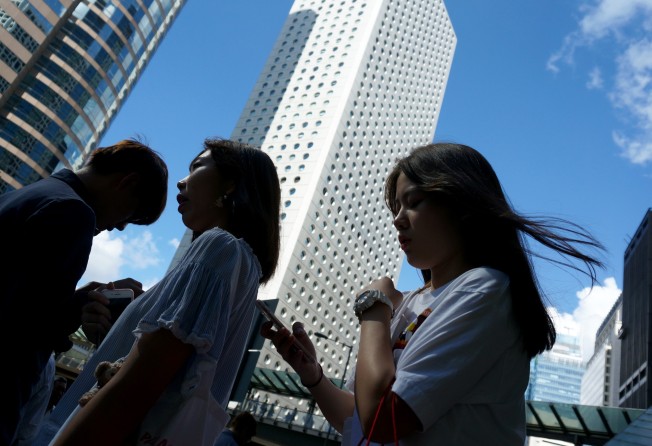Despite more women entering the Hong Kong workforce, few make it to senior management positions
Only 29pc of senior positions are held by women even though they made up 55 per cent of the city’s workforce in 2016

Women in Hong Kong still have a long way to go before they achieve gender equality in the workplace, despite improvements in the percentage of female workers in high positions over the past year.
Just 29 per cent of management positions in Hong Kong are held by women, making it the second lowest ranked region in Asia. The city stands above Japan, where only 22 per cent of management positions are held by women, according to the 2018 Hays Asia Salary Guide, but below the Asian average of 31 per cent.
Malaysia was the highest ranked region in Asia, at just 38 per cent, followed by mainland China and Singapore at 31 per cent and 30 per cent, respectively.
“At the heart of this lies the current status quo on a societal level, not only in Hong Kong but regionally – and even globally,” said Kiersten Barnet, deputy chief of staff to the chairman at Bloomberg, which has just released its 2018 gender equality index. “The irony is that the region also has highly educated women with strong work experience who contribute to economic growth in their own right.”
Despite more women entering the workforce, few are advancing to senior positions when compared with men. According to government statistics, the labour force participation rate for women in Hong Kong increased from 49 per cent in 2001 to 55 per cent in 2016.
But despite an amendment in 2013 by the Hong Kong stock exchange that requires companies listed in the city to disclose if they have adopted a diversity policy, or explain their reasoning if not, there has not been a significant increase in women on boards of directors, according to a 2017 study by multinational company Deloitte.
The report shows Hong Kong is the third worst region in Asia for its percentage of women on boards of directors, with just 9.6 per cent of board seats held by females. Up by 1.6 per cent since 2016, the city does come above Japan, at 4.2 per cent; Indonesia, at 7.9 per cent; and the Asian average of 7.8 per cent.
“I was a little bit surprised with the figures for Hong Kong,” said Dean Stallard, the Hong Kong managing director at recruiting company Hays. “But it is an opportunity.”
The city, Stallard said, is making some progress.
From 2016 to 2017, Hong Kong recorded a 5 per cent increase in the number of women in management positions, the best improvement in Asia, but further changes in company policies were needed to make climbing the ranks easier for women.
“Adopting flexible working arrangements, shared parental leave and meritocratic policies are some practical steps organisations can take to help women realise their career ambitions,” said Bloomberg’s Barnet.
Currently, 69 per cent of companies have flexible working hours, according to Hays, but only 28 per cent support part-time employment; 14 per cent give flexible leave options; and an even smaller 13 per cent allow for career breaks.
Women in Hong Kong are given 10 weeks as maternity leave, compared with a minimum of 12 weeks in the United States and a total of 52 in the United Kingdom, and only 18 per cent of companies in the city allow increased maternity or paternity leave.
“Organisations should continue to roll out programmes that support women at work, such as carer leave policies and flexi-hour programmes,” said Barnet. “It means being mindful of creating equal opportunities in the workplace, based on merit, for men and women in teams.”
“What is comforting to note is that more and more employers are actively introducing progressive policies – such as flexible working hours and shared parental leave – to encourage a greater work-life balance that benefits women as well as men,” said Stallard.
“Hong Kong is taking a positive step in the right direction in tackling gender bias and achieving a gender equal workplace.”